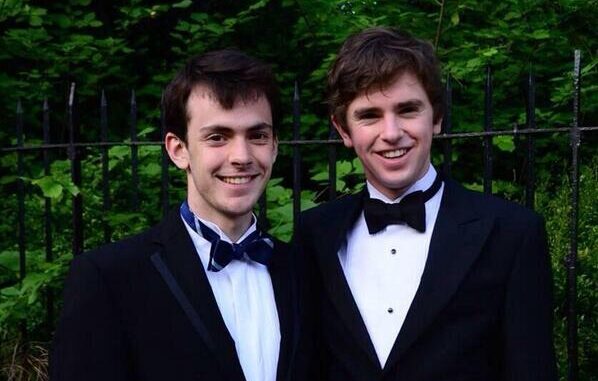
In the mid-2000s, two of Britain’s brightest young actors — Skandar Keynes and Freddie Highmore — were household names, enchanting audiences across the globe with their intelligence and poise on screen. A photograph from 2008 captures them as teenagers: Freddie, then 16, fresh from the acclaim of Finding Neverland and Charlie and the Chocolate Factory, and Skandar, already beloved as the complex and courageous Edmund Pevensie in The Chronicles of Narnia.
Both seemed destined for long Hollywood careers. Yet what sets their story apart is not how brightly they shone in childhood, but how gracefully they stepped away from the spotlight to pursue something rarer — a life defined by intellect and purpose rather than fame.
Freddie Highmore’s quiet brilliance was evident early on. While many of his peers remained in the entertainment circuit, he chose to balance his acting career with a rigorous academic path, enrolling at the University of Cambridge to study Spanish and Arabic. His linguistic curiosity and global perspective revealed the mind of a thinker — someone as fascinated by cultures and ideas as he once was by scripts and characters.
Skandar Keynes, meanwhile, took an even bolder turn. After completing The Voyage of the Dawn Treader — the final Narnia installment — Keynes made the deliberate decision to leave acting behind. Like Highmore, he entered Cambridge, where he specialized in Arabic and Middle Eastern history. His passion for politics and analysis led him toward a career in policy and public service, far removed from red carpets but deeply grounded in real-world impact.
When the two eventually graduated from Cambridge, it was more than a personal milestone — it was a moment that symbolized transformation. Their parallel journeys from cinematic fame to academic excellence defied the conventional narrative of the “child star.” They proved that curiosity, education, and discipline can craft a legacy more enduring than any role.
Today, Freddie Highmore stands as one of television’s most respected young talents, earning acclaim not only for his acting in The Good Doctor but also for his work behind the scenes as a writer and producer. Skandar Keynes remains intentionally private, channeling his insight into political consultancy and research. Though their paths diverged, both embody the same principle: that success is not measured by constant visibility, but by meaningful growth.
That 2008 photo now feels almost prophetic — two young men on the verge of adulthood, unaware that their brightest achievements would emerge not under studio lights, but in lecture halls and libraries. Their story is a rare Hollywood epilogue — one where fame gave way to intellect, and where the journey from Narnia to Cambridge became not just a career shift, but a testament to the power of reinvention.
